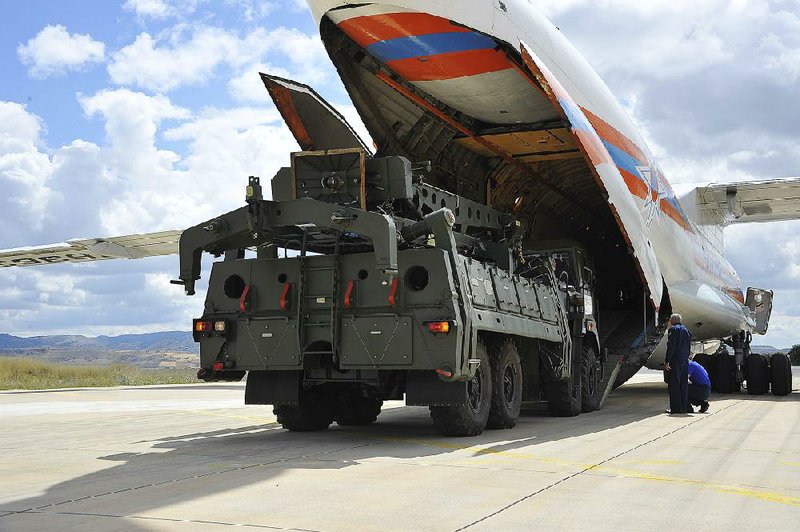ANKARA, Turkey -- The first shipment of a Russian missile-defense system has arrived in Turkey, the Turkish Defense Ministry said Friday, moving the country closer to possible U.S. sanctions and a new standoff with Washington.
A Defense Ministry statement said "the first group of equipment" of the S-400 air-defense systems has reached the Murted Air Base near the capital, Ankara. Defense Minister Hulusi Akar said three planes carrying the equipment landed at the airfield Friday, adding that the delivery would continue in the coming days.
The U.S. has strongly urged NATO member Turkey to pull back from the deal -- reportedly costing more than $2 billion -- warning the country that it will face economic sanctions under the Countering America's Adversaries Through Sanctions Act if it goes ahead with the purchase. It has also said Turkey won't be allowed to participate in the program to produce high-tech F-35 fighter jets.
Although U.S. President Donald Trump expressed sympathy toward Turkey's decision to purchase the Russian system during a meeting with Turkish President Recep Tayyip Erdogan on the sidelines of a G-20 meeting in Japan, Washington has repeatedly said that the Russian system is incompatible with NATO systems and is a threat to the F-35.
Despite the warnings, the administration was publicly silent on how it would respond to Turkey's announcement Friday. After saying it would hold a news conference Friday morning to discuss the issue, the Pentagon later told reporters that it had been postponed "indefinitely."
The acting secretary of defense, Mark Esper, spoke by phone with his Turkish counterpart for 30 minutes, but the Pentagon declined to discuss the call.
On Capitol Hill, members of Congress condemned the Turks' move.
"That a NATO ally would choose to side with Russia and Vladimir Putin over the alliance and closer cooperation with the United States is hard to fathom," the Democratic chairman and the ranking Republican member of the House Foreign Affairs Committee said in a joint statement.
"Turkey and Erdogan must face stiff consequences for this decision," said the joint statement by Rep. Eliot Engel, D-N.Y., and Rep. Michael McCaul, R-Texas.
In the Senate, too, Republicans and Democrats alike expressed dismay.
"By accepting delivery of the S-400 from Russia, President Erdogan has chosen a perilous partnership with Putin at the expense of Turkey's security, economic prosperity and the integrity of the NATO alliance," the top members of the Senate Foreign Relations and Armed Services committees said in a joint statement.
In their joint statement, the Senate committee leaders also called the Turkish action "a troubling signal of strategic alignment with Putin's Russia" and a threat to the F-35 program.
Four other senators -- two Democrats and two Republicans -- issued a joint statement Friday expressing disappointment that Turkey has chosen to buy a Russian-made system designed to "target and destroy" the F-35.
"Turkey is trying to play both sides, but we will not allow sensitive U.S. military technology in the F-35 to be at risk," the senators said. "Turkey cannot have both Russian and American defense equipment sitting side by side."
The prospect of a further rupture in Turkey's relations with Washington also raises a delicate issue: the status of American nuclear weapons stored at Turkey's Incirlik air base. Turkey has had a nuclear role in NATO for decades, but this new split is likely to cause some in Washington to question the wisdom of keeping those nuclear bombs at Incirlik. Locations of U.S. nuclear weapons abroad are not publicly acknowledged by the U.S. as a matter of policy.
Turkey has insisted that choosing which defense equipment to purchase is a matter of national sovereignty.
"We've always said regarding the S-400s that it's an agreement that has been finalized and the process continues to progress," Turkish Foreign Minister Mevlut Cavusoglu told reporters. "There's no problem and the process will continue in a healthy way going forward."
In Russia, Kremlin spokesman Dmitry Peskov told reporters: "Everything is going strictly in compliance with the agreements and contracts signed." He would not comment on a timeframe for the delivery but insisted that both parties are committed to complying with the contract.
Turkey has said it was forced to buy the S-400s because Washington refused to supply the American-made Patriot systems to Turkey.
U.S. officials have since encouraged Turkey to buy the Patriot missile-defense system instead of the S-400s. Turkey has said the offer does not meet its requirements.
On Friday, Akar said, however, that Turkey was also considering purchasing the American system.
"Our talks on the Patriot issue are continuing," the state-run Anadolu Agency quoted Akar as saying. "As long as they meet the criteria, of course we are considering the procurement of the Patriots to cover our need for a long-range air and missile defense system."
Information for this article was contributed by Nataliya Vasilyeva, Robert Burns and Matthew Lee of The Associated Press.
A Section on 07/13/2019
